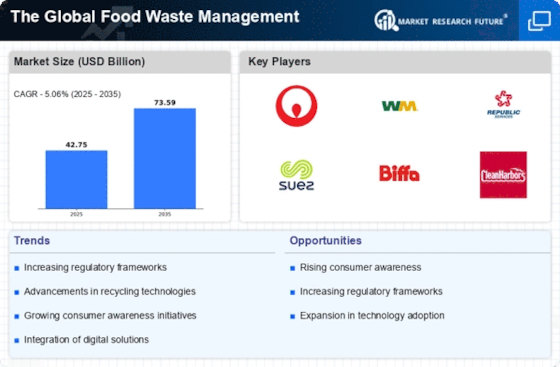Top Industry Leaders in the Food Waste Management Market
The global market for managing food waste is currently undergoing rapid expansion, propelled by a heightened awareness of the environmental and economic repercussions of food waste. This growth is further intensified by stringent regulations and an increasing consumer demand for sustainable solutions. Within this dynamic environment, a diverse array of players is contributing to the market, each employing distinctive strategies to gain a foothold and capitalize on emerging opportunities.
Key Players and Strategies: The market boasts a variety of key players, including
- Andritz Ag (Austria)
- Waste Management, Inc. (U.S.)
- Veolia Environnement S.A. (France)
- Republic Services, Inc. (U.S.)
- Stericycle, Inc. (U.S.)
- Covanta Holding Corporation (U.S.)
- Waste Connections, Inc. (Canada), and others.
-
Established Waste Management Companies: Major entities such as Republic Services, Waste Management, Inc., and Veolia Environnement leverage their established infrastructure, operational expertise, and extensive client base to provide comprehensive food waste management solutions. Their strategies revolve around expanding service offerings, integrating innovative technologies like anaerobic digestion and composting, and pursuing strategic acquisitions.
-
Emerging Technology-Driven Startups: Nimble startups like Winnow, Food Loop Connect, and FoodMaven are disrupting the market with innovative technologies addressing specific pain points in the food waste management value chain. Their approach involves developing AI-powered waste detection and prediction systems, facilitating food surplus redistribution, and providing data-driven insights for waste reduction.
-
Specialty Food Waste Processors: Companies like Ecolab and Stericycle focus on specific food waste streams such as oil and grease, bakery waste, and animal byproducts. Their emphasis lies in developing specialized processing technologies, offering customized solutions, and leveraging their expertise in handling complex waste streams.
-
Non-Profit Organizations: Entities like Foodbanks Canada and Feeding America play a vital role in food waste reduction by collecting surplus food and distributing it to those in need. Their strategies include building partnerships with food businesses, raising awareness about food waste, and advocating for policy changes.
Factors for Market Share Analysis:
-
Market Share by Service Type: This analysis considers factors such as the volume of food waste processed, revenue generated, and geographic presence. It also delves into the market share of various service types like collection, transportation, processing, and disposal.
-
Market Share by Technology: Analysis by technology focuses on the market share of different food waste processing technologies like anaerobic digestion, composting, incineration, and animal feed production. This segment also assesses the adoption rate and growth potential of emerging technologies.
-
Market Share by End-User: Market share analysis by end-user segments identifies the leading industries generating food waste, such as food service, agriculture, and retail. It assesses the specific needs of each end-user and the market share held by companies catering to those needs.
-
Market Share by Region: Regional analysis provides insights into the market share of different geographic regions like North America, Europe, Asia-Pacific, and Latin America. It considers factors like the regulatory landscape, economic development, and consumer preferences.
New and Emerging Trends:
-
Digitalization and AI: Companies are increasingly incorporating AI and data analytics to optimize food waste management processes, including waste prediction, route optimization, and resource allocation.
-
Circular Economy: The focus is shifting towards closing the loop in the food system through initiatives like food surplus redistribution, upcycling food waste into new products, and using food waste as a resource for renewable energy generation.
-
Decentralized Processing: Smaller, on-site food waste processing solutions are gaining traction, especially in urban areas. These solutions offer convenience, reduce transportation emissions, and provide valuable resources like compost.
-
Consumer Engagement: Consumers are becoming increasingly conscious of food waste and are demanding sustainable solutions. This trend is driving companies to develop user-friendly apps and educational campaigns to promote food waste reduction at the consumer level.
Overall Competitive Scenario: The competitive landscape of the food waste management market is dynamic and fragmented. Established players face competition from agile startups, technology-driven companies, and non-profit organizations. This competition is fostering innovation and compelling companies to develop more efficient and sustainable solutions.
The market is poised for continued growth in the coming years, driven by factors such as rising food waste volumes, stricter regulations, and growing consumer awareness. Companies that can adapt to the changing landscape, leverage emerging technologies, and offer customized solutions to diverse end-user needs will be best positioned to capitalize on this growth.
Additional Observations:
-
Collaboration and partnerships are crucial for success in this market, as different players can combine their expertise and resources to offer comprehensive solutions.
-
Government policies and regulations play a significant role in shaping the market landscape and driving innovation.
-
The market is likely to see further consolidation, with mergers and acquisitions occurring between companies seeking to expand their geographic reach or technology portfolio.
Industry Developments and Latest Updates:
-
Andritz Ag (Austria): October 27, 2023: Announced the launch of the ThruPutPro high-consistency pumping system for efficient handling of high-fiber organic waste in anaerobic digestion processes. (Source: Andritz press release)
-
Waste Management, Inc. (U.S.): November 10, 2023: Launched a new organic waste recycling program in San Francisco in partnership with Recology. (Source: Waste Management website)
-
Veolia Environnement S.A. (France): October 26, 2023: Signed an agreement with Shell to collaborate on developing bioplastics from organic waste. (Source: Veolia press release)
-
Republic Services, Inc. (U.S.): December 5, 2023: Announced an $80 million investment in renewable natural gas projects, including food waste processing facilities. (Source: Republic Services website)










